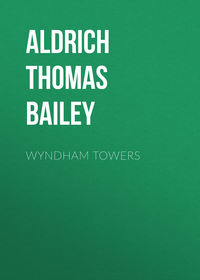 полная версия
полная версияDaisy's Necklace, and What Came of It
When Bell and Mortimer came up from the sea-beach, the moonlight, breaking through this leafy lattice, made the chamber as that of Abon Ben Adhem – "like a lily in bloom." Nanny brought a lamp, and kissed them good-night.
"O, we don't want a lamp all this moon!" cried Bell.
The boy sat half undressed at the window. "Bell loves moonlight like a fairy," he said.
Bell's robe fell to her knees in snowy folds, and she stood like a petite Venus rising from the froth. Then brother and sister braided their voices in a simple prayer to Our Father in Heaven. They prayed for kind old Nanny, and for one on the wide sea.
"When will father come home?" asked Bell, for the hundredth time that day.
"It will not be long now. When the boughs of the cherry trees are an inch deep with ice, and the logs crackle in the fire-place – then he will come. Let us go to sleep, and dream of him."
And thus, hand in hand, the two went in to Dream-land —
The world of Sleep,The beautiful old World!The dreamy Palestine of pilgrim Thought!The Lotus Garden, where the soul may lieLost in elysium, while the music moanOf some unearthly river, faintly caught,Seems like the whispering of Angels, blownUpon æolian harp-strings! And we changeInto a seeming something that is not!II
Ah, yes! with joy the April rainThrills nature's breast; but mine with painSigheth: "He will not come again!"Albert Laighton.II.
THE DEAD HOPE
Time's Changes – Fall-down Castles – Little Bell Waiting – When will Father Come Home? – Little Bell Weary – What the Sea said – Never more.
Longfellow beautifully asks in Hyperion, "What is Time, but the shadow of the hour-hand on a dial-plate?"
The flowers of the earth and the hearts of men are dial-plates. The shadows coming and going on them are the hour-hands; when a flower fades, or a heart ceases to beat, it is only a weight run down. The whole universe is but one immense time-piece, throbbing with innumerable wheels, heavy with weights, and wearing itself away! Desire is a restless pendulum, one end linked to the heart, and the other pointing downward!
A year had added another link to that chain which stretches through eternity. A year! Battles lost and won: nations in mourning for their dead: ships gone down at sea; and new paths worn to graveyards!
O, for the castles that blow down in a year!
But time fell gently on the inmates of the Old House. The trees and vines were a little larger; and winter had somewhat browned the gables. Bell was paler and more beautiful, and Mortimer was still the same dreamer.
There was a question which haunted the Old House. It was heard in the garden, at "the round window," and on the stair.
"When will father come home?"
The months flew away, like carrier doves, with memories beneath their wings.
"When will father come home?"
And the question was asked again and again, till the little lips and heart of Bell grew weary. Then she folded her hands, and said:
"He will never come!"
Her blue eyes became more dreamy, and her slight form – so very slight – glided about the house. She would listen to the sea. Once she said, "Never more!" and the sea repeated it with a human voice. In the still night she asked, —
"When will father come home?"
"Never more," said the sea – and she heard it through the open window – "Never more!"
She waited, and the months went by.
Was the child Bell the only one in this world waiting?
Who has not some hope at sea? Who has not waited, and watched, and grown weary?
Who has not a question in his heart, to which a low spirit-voice replies:
"Never more!"
III
I saw our little Gertrude die:She left off breathing, and no moreI smoothed the pillow beneath her head.She was more beautiful than before,Like violets faded were her eyes;By this we knew that she was dead!Through the open window looked the skiesInto the chamber where she lay,And the wind was like the sound of wings,As if Angels came to bear her away.The Golden Legend.III.
SOUL-LAND
Autumn and Winter – By the Fireside – Where little Bell is going – Nanny sings about Cloe – Bell reads a Poem – The flight of an Angel – The Funeral – The good Parson – The two Grave-stones.
It was autumn. The wind, with its chilly fingers, picked off the sere leaves, and made mounds of them in the garden walks. The boom of the sea was heavier, and the pale moon fell oftener on stormy waves than in the summer months. Change and decay had come over the face of Earth even as they come over the features of one dead. In woods and hollow places vines lay rotting, and venturesome buds that dared to bloom on the hem of winter; and the winds made wail over the graves of last year's flowers.
Then Winter came – Winter, with its beard of snow – Winter, with its frosty breath and icy fingers, turning everything to pearl. The wind whistled odd tunes down the chimney; the plum-tree brushed against the house, and the hail played a merry tattoo on the window-glass. How the logs blazed in the sitting room!
Bell did not leave her room now.
Her fairy foot-steps were never heard tripping, nor her voice vibrating through the entry in some sweet song. She scarcely ever looked out at the window – all was dreary there; besides, she fancied that the wind "looked at her." It was in her armchair by the antique fire-place that she was most comfortable. She never wearied of watching the pictured tiles; and one, representing the infant Christ in the manger, was her favorite. There she sat from sunny morn until shadowy twilight, with her delicate hands crossed on her lap, while Mortimer read to her. Sometimes she would fix her large, thoughtful eyes on the fantastic grouping of the embers at her feet, and then she did not hear him reading.
She was wandering in Soul-land.
Heaven's gates are open when the world's are shut. The gates of this world were closing on Bell, and her feet were hesitating at the threshold of Heaven, waiting only for the mystic word to enter!
Very beautiful Bell was. Her perfect soul could not hide itself in the pale, spiritual face. It was visible in her thought and in her eyes. There was a world of tender meaning in her smile. The Angel of Patience had folded her in its wings, and she was meek, holy. As Mortimer sat by her before the evening lamps were lighted, and watched the curious pictures which the flickering drift-wood painted on the walls, he knew that she could not last till the violets came again. She spoke so gently of death, the bridge which spans the darkness between us and Heaven – so softened its dark, dreadful outlines, that it seemed as beautiful as a path of flowers to the boy and Nanny.
"Death," said Bell one day, "is a folding of the hands to sleep. How quiet is death! There is no more yearning, no more waiting in the grave. It comes to me pleasantly, the thought that I shall lie under the daisies, God's daisies! and the robins will sing over me in the trees. Everything is so holy in the church-yard – the moss on the walls, the willows, and the long grass that moves in the wind!"
Poor Nanny tried to hum one of her old ditties about Cloe and her lover; then suddenly she found something interesting at the window. But it would not do. The tears would come, and she knelt down by Bell's side, and Bell's little hand fell like a strip of white moonlight on Nanny's hair.
"We shall miss you, darling!" sobbed Mortimer.
"At first, won't you?" and Bell smiled, and who knows what sights she saw in the illumined fire-place? Were they pictures of Heaven, little Bell?
"What shall I read to you, pet?" asked Mortimer one morning. She had been prattling for an hour in her wise, child-like way, and was more than usually bright.
"You shall not read to me at all," replied Bell, chirpingly, "but sit at my feet, and I will read to you."
She took a slip of paper from her work-basket, and her voice ran along the sweetest lines that the sweetest poet ever wrote. They are from Alfred Tennyson's "May Queen."
"I did not hear the dog howl, mother, or the death-watch beat,There came a sweeter token when the night and morning meet;But sit beside my bed, mother, and put your hand in mine,And Effie on the other side, and I will tell the sign.All in the wild March morning I heard the angels call;It was when the moon was setting, and the dark was over all;The trees began to whisper, and the wind began to roll,And in the wild March morning I heard them call my soul.For lying broad awake I thought of you and Effie dear;I saw you sitting in the house, and I no longer here;With all my strength I prayed for both, and so I felt resigned,And up the valley came a swell of music on the wind.I thought that it was fancy, and I listened in my bed,And then did something speak to me – I know not what was said;For great delight and shuddering took hold of all my mind,And up the valley came again the music on the wind.But you were sleeping; and I said, 'It's not for them: its mine,'And if it comes three times, I thought, I take it for a sign;And once again it came, and close beside the window-bars,Then seemed to go right up to Heaven, and die among the stars.So now I think my time is near – I trust it is. I knowThe blessed music went that way my soul will have to go;And for myself, indeed, I care not if I go to-day,But, Effie, you must comfort her when I am past away;And say to Robin a kind word, and tell him not to fret —There's many worthier than I would make him happy yet; —If I had lived – I cannot tell – I might have been his wife;But all these things have ceased to be, with my desire of life.Oh look! the sun begins to rise, the heavens are in a glow;He shines upon a hundred fields, and all of them I know;And there I move no longer now, and there his light may shine —Wild flowers in the valley for other hands than mine.O sweet and strange it seems to me, that ere this day is done,The voice that now is speaking may be beyond the sun —To lie within the light of God, as I lie upon your breast —And the wicked cease from troubling, and the weary are at rest!"When Bell had finished reading, she took Mortimer's hand in her own.
"I shall not die until the violet comes – the beautiful violet, with its clouded bell!"
March melted into April – the month of tears! Then came blossoming May, and still Bell lingered, like a strain of music so sweet that the echoes will not let it die.
One morning in June, the sun with noiseless feet came creeping into the room – and Bell was dying. Mortimer was telling her of some sea-side walk, when the unseen angel came between them. Bell's voice went from her, her heart grew chilly, and she knew that it was death. The boy did not notice the change; but when her hand lay cold in his, he looked up with fear. He saw her beautiful eyes looking heavenward, and those smiles which wreathe the lips of the young after death – the sunset of smiles.
"Bell! Bell! Bell!"
But she did not hear him.
The viewless spirits of flowers came through the open window into the quiet room; and the winds, which made the curtains tremble, gently lifted the tresses of the sleeping angel. Then the chiming of village bells came and went in pulses of soft sound. How musical they were that morning! How the robins showered their silvery notes, like rain-drops among the leaves! There was holy life in everything – the lilac-scented atmosphere, the brooks, the grass, and the flowers that lay budding on the bosom of delicious June! And thus it was, in the exquisite spring-time, that the hand of death led little Bell into Soul-land.
One afternoon, the blinds were turned down: not a ray of light stole through them, only the spicy air. There was something solemn stalking in the entries, and all through the house. It seemed as if there was a corpse in every room.
The way the chairs were placed, the darkened parlor, the faded flowers on the mantel-piece, and the brooding silence said it – said that Bell was dead!
Yes! In the little parlor she lay, in her white shroud. Bell? No; it was not Bell. It was only the beautiful robe which her spirit in its flight had cast aside!
There was a moving of feet to and fro. Gradually, the room became full of forms. The village parson stood among them. His hair had the white touch of age, and his heart knew the chastening hand of God. "Exceeding peace" was written on his meek face. He lifted up his soul on the arms of prayer. He spoke of the dead, whose life had been as pure as a new snow. He spoke cheerfully and tenderly, and sometimes smiled, for his
"Faith was large in Time,And that which shapes it to some perfect end."He had drank at the fountain of God's word; his soul had been refreshed, and his were not the lips to preach the doctrine of an endless wail. He knew that there are many mansions in our Father's house; and he said that Bell was happier there than here. He glanced back upon her infant days, and ran along the various threads of her life, to the moment death disentangled them from the world. "This little one in her shroud," he said, "is an eloquent sermon. She passed through the dark valley without fear; and sits, like Mary, at the feet of our Saviour." Of this life, he said: "It is but an imperfect prelude to the next." Of death: "It is only a brief sleep: some sunny morning we shall wake up with the child Bell, and find ourselves in Heaven!"
The coffin was closed, and the train passed through the gravelled walk.
Then came that dull, heavy sound of earth falling on the coffin-lid, which makes one's heart throb. Did you ever hear it?
When Bell had been a year in Heaven, a plain head-stone was placed over Nanny. She lingered only a little while after her darling. She folded her arms and fell asleep one summer twilight, and never again opened her kind old eyes on this world. Age had weakened her frame, and the parting of soul and body was only the severing of a fragile cord.
Mortimer did not remain long in the old house; its light and pleasantness had passed away. The little stock of money which his father had left previous to his last voyage, was exhausted; he could earn nothing in the village. His early dream of the great city came over him again. He yearned for its ceaseless excitement, its grandeur – he never thought of its misery, its sin and pollution. Through the length of one July night he lay awake in bed, while his eyes were like kaleidoscopes, taking a thousand arabesque forms and fancies. Toward morning he fell asleep, having built some fall-down castles in the air. The next day he took a last, lingering look at the old rooms; a last ramble on the sea-shore; he sat an hour under the braided branches of the cherry trees, gave a parting look at the white caps of the sea, and turned his eyes to the city in the dim distance – the great city-ocean, with no one to point out to him its sunken reefs, its quicksands, and maelstroms.
Next to Bell's grave he placed a simple tablet to the memory of his father.
"This sod does not enfold him," said Mortimer to himself; "but it will be pleasant for me to think, when I am far away, that their names are near together."
So he left them in the quiet church-yard at Ivyton – left them sleeping among the thick musk-roses, in the warm sunshine; and the same berylline moss was creeping over the two mounds. One head-stone said "Little Bell," and the other:
SACREDTO THE MEMORYOFOUR FATHER,LOST AT SEA,18 –IV
The Almighty Dollar.
Washington Irving.The age is dull and mean. Men creep,Not walk; with blood too pale and tameTo pay the debt they owe to shame;Buy cheap, sell dear; eat, drink, and sleepDown-pillowed, deaf to moaning want;Pay tithes for soul-insurance; keepSix days to Mammon, one to Cant.J. G. Whittier.Every one is as God made him, and oftentimesA great deal worse.Miguel De Cervantes.IV.
A FEW SPECIMENS OF HUMANITY
Down Town – Messrs. Flint & Snarle – Tim, the Office Boy, and the pale Book-Keeper – The Escritoire – The Purloined Package – Mr. Flint goes Home – Midnight – Miss Daisy Snarle – The Poor Author.
In one of those thousand and one vein-like streets which cross and recross the mercantile heart of Gotham, is situated a red brick edifice, which, like the beggar who solicits your charity in the Park, has seen better days.
In the time of our Knickerbocker sires, it was an aristocratic dwelling fronting on a fashionable street, and "Jeems," in green livery, opened the hall door. The street was a quiet, orderly street in those days – a certain air of conscious respectability hung about it. Sometimes a private cabriolet rolled augustly along; and of summer evenings the city beaux, with extraordinary shoe-buckles, might have been seen promenading the grass-fringed sidewalks. To-day it is a miasmatic, miserable, muddy thoroughfare. Your ears are startled by the "Extray 'rival of the 'Rabia," and the omnibuses dash through the little confined street with a perfect madness. Instead of the white-kidded, be-ruffled gallants of Eld, you meet a hurrying throng of pale, anxious faces, with tare, tret and speculation in their eyes.
It is a business street, for Mammon has banished Fashion to the golden precincts of Fifth Avenue. The green of Jeems' livery is, like himself, invisible. He has departed this life – gone, like Hiawatha, to the Land of the Hereafter – to the land of spirits, where we can conceive him to be in his element; but he has a "town residence" in an obscure graveyard, with his name and "recommendation" on a stone door-plate. His mundane superiors are reclining beneath the shadow of St. Paul's steeple, where they are regaled with some delectable music (if you would only think so) from the balcony of the Museum opposite, and have the combined benefit of Barnum's scenic-artist and the Drummond light.
The massive door-plate, and highly polished, distorted knocker, no longer grace the oaken panels of number 85; but a republican sign over the family-looking doorway tells you that "the front room, second floor," is occupied by Messrs. Flint & Snarle. After passing up a flight of broad, uncarpeted stairs, you again see the name of that respectable firm painted on a light of ground glass set in the office door. Once on the other side of that threshold, you breathe mercantile air. There have been so many brain-trying interest calculations worked out on those high desks, that the very atmosphere, figuratively speaking, is mathematical.
The sign should not read Flint & Snarle, for Snarle has been dead six months, and it is not pleasant to contemplate a name without an owner – it is not to every one, but Mr. Flint likes to read the sign, and think that Snarle is dead. He was the reverse of Flint, and that his name should have been Snarle at all is odd, for in life he was the quintessence of quietness, and the oil of good nature. But Flint is well named; he is chalcedony at heart. Nobody says this, but everybody knows it. Nell, the pretty match-girl, who sells her wares in Wall-street, never approaches him, nor the newsboys; and blind men, with sagacious, half-fed dogs, steer clear of him by instinct. He doesn't tolerate paupers, and Italian hand-organs with monkey accompaniments – not he.
The man who has not as much money as the surviving senior of Flint & Snarle, is a dog – in Flint's distinguished estimation. His God is not that divine Presence, whose thought
"Shaped the world,And laid it in the sunbeams."Flint's God is Gold. —
"Gold! Gold! Gold! Gold!Bright and yellow, hard and cold,Molten, graven, hammered and rolled;Heavy to get, and light to hold;Hoarded, bartered, bought and sold;Stolen, borrowed, squandered, doled;Spurned by the young, but hugged by the oldTo the very verge of the church-yard mould;Price of many a crime untold:Gold! Gold! Gold! Gold!"Flint is about fifty-three years of age; but if you could forget his gray hair, and look only at those small, piercing black eyes, you would hardly think him forty. His black dress-coat is buttoned around his somewhat attenuated form, and he wears a stiff white cravat because it looks religious. In this respect, and perhaps in others, you will find Flint's prototype on every corner – people who look religious, if religion can be associated with the aspect of an undertaker.
It is Monday morning.
Mr. Flint sits in his private office reading the letters. There is a window cut in the wall, and he glances through it now and then, eyeing the book-keeper as if the poor careworn fellow were making false entries. On a high consumptive-looking stool sits the office boy, filing away answered letters and sundry bills paid. The stool seems so high and the boy so small, that he at once suggests some one occupying a dangerous position – at a mast-head or on the golden ball of a church-steeple. For thus risking his life, he receives "thirty dollars per year, and clothing." We like to have forgotten that. The said clothing consists of one white cravat full of hinges, and a dilapidated coat, twelve sizes too large for him, his widowed mother supplying the deficiency.
Save the monotonous ticking of a thick-set, croupy clock, and the nervous scratching of pens, not a sound is heard.
Mr. Flint in deep thought, with his thumbs lost in the arm-holes of a white vest, paces up and down his limited sanctum, just as a thoughtful-eyed, velvet-mouthed leopard walks its confined cage, only waiting for a chance to put its paws on somebody. The stool on which the boy is sitting is a rickety concern, and its creakings annoy Mr. Flint, who comes out, and looks over the orphan's shoulder. If his lynx eyes discover a document incorrectly filed, he pinches the delinquent's ears, till he (the orphan) is as red in the face as an August sunset. Mr. Flint chuckles when he gets back to his desk, and seems to enjoy it immensely, for he drums out an exhilarating dead march with his long, wiry fingers on the cover of the letter-book. The pale book-keeper – his hair and eyes are darker than when we first saw him sitting with little Bell at "the round window" in the Old House – continues to write assiduously; and the orphan thinks that he hears fire-bells, his ears ring so.
He's an unfortunate atom of humanity, that office-boy. He was never young. He never passed through the degrading cycles of infancy – never had any marbles or hoops: his limbs were never ignominiously confined by those "triangular arrangements" incidental to babyhood. At five, when other children are bumping their heads over steep stairs, he smoked cinnamon segars, and was a precocious, astute little villain at seven. For thirty-six months he folded books for Harper & Brothers, and at the advanced age of ten years three months, was bound over to the tender mercies of Flint & Snarle for "thirty dollars per year and clothing," (so the indentures read;) but as he is charged with all the inkstands demolished during the term, and one gross of imaginary lead pencils, he generally has about twenty-five dollars to his credit on the 1st of January, which Flint generously offers to keep for him at four per cent. interest, and which offer the ungrateful orphan "firmly but respectfully" declines.
"Mortimer!" cries Mr. Flint, in a quick, snarly voice from the inner office.
The book-keeper lays down the pen which he has just dipped in the ink, and disappears in the little room. Mr. Flint is turning over the leaves of the invoice book.
"In thirteen pages there are no less than two blots and five erasures. You have grown careless in your penmanship lately;" and Mr. Flint closes the book with a report like that of a pocket-pistol, and opens it again. One would suppose the office-boy to be shot directly through the heart; but he survives, and is attacked with a wonderful fit of industry.
"Do you write in your sleep?" inquires Mr. Flint, with a quiet insolence.
Mortimer thinks how often he has toiled over those same pages at hours when he should have been sleeping – hours taken from his life. But he makes no reply. He only bites his lips, and lets his eyes flash. Suddenly a thought strikes him, and, bending over Mr. Flint's shoulder, as if to examine more closely his careless chirography, he takes a small key from an open drawer in the escritoire behind him, and drops it into his vest-pocket. After receiving a petulant reprimand, Mortimer returns to his desk; and again that weary, weary pen scratches over the paper.









